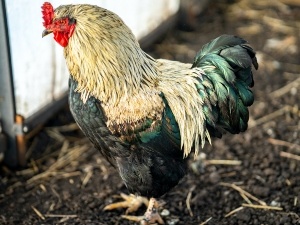
Any sign of illness coming from your chicken will be concerning to any chicken raiser, the bird sneezing when eating would definitely seem like a sign of illness.
This article looks into why your chicken is sneezing when eating.
Table of Contents
Chicken sneezing when eating:
Humans usually sneeze when we start to suffer from respiratory illnesses, this is actually similar for chickens. Here is what you need to know if your bird is sneezing when eating:
It’s a nasal blockage:
While your bird may start sneezing if it has a respiratory illness, if the bird is only sneezing when eating then the issue is likely an irritation in the bird’s nasal passages.
If your bird is eating its feed in a rusty old barn then this could be one of the reasons why the bird is sneezing.
The dust from your bird’s feed, or the dander from your bird’s feathers, may be getting stuck in your bird’s nasal passages while it eats and this could be causing her to sneeze.
Sneezing helps the bird clear its delicate respiratory system. If the bird’s upper respiratory tract is irritated then this can cause the bird to sneeze.
Any small particle, like dust, or feed, can cause this irritation and cause your bird to sneeze.
What to do:
If you know that the bird is sneezing on occasion or know that the bird is exposed to dust or feed particles when it eats then you don’t have to worry, this sneezing is normal.
Sneezing does happen to birds on occasion and is not a cause for alarm. Just observe the bird when she sneezes to see if she seems to be in distress more than usual, if she is not in distress and continues eating then you don’t have to worry.
If she seems to be in distress even after eating then you can start to worry.
When to worry:
You’d only need to start to worry if the bird shows signs of suffering from a respiratory illness in addition to all this sneezing.
Signs of a respiratory illness in chickens, in addition to the sneezing, include coughing, a decreased appetite, lethargy, wheezing, reduced egg production, labored breathing, discharge from the birds eyes or nostrils, a loss of condition, swelling at the bird’s eyes or beak, and a change in the birds comb or wattle color
If your bird starts showing these symptoms along with the sneezing then the bird may actually have a respiratory illness.
Listen to the bird’s chest and check for rattling or a congested sound when the bird is breathing, if you hear this then take the bird to the vet.
The vet will examine the bird and test for a respiratory illness. Once the vet has diagnosed the bird your bird will be given the appropriate medical treatment.
If you enjoyed this article then you may also be interested in other bird related articles. Here are some articles that you may be interested in: Why Your Chickens Head Doesn’t Move, How Do Wild Chickens Survive In The Winter?, Why Is My Duckling’s Neck Swollen?, Duck With A Twisted Foot, Chicken Shaking Head And Walking Backward, Do Chickens Shake When Scared?, Chicken Limping After Dog Attack, Chicken Trembling Legs, Rooster Shaking Legs


